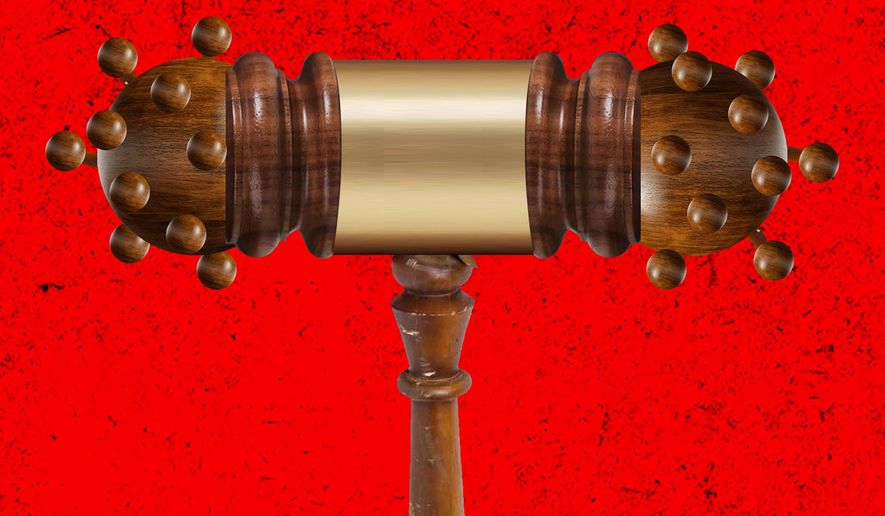OPINION:
The race to develop an effective COVID-19 vaccine in less than one year was a testament to the ingenuity, innovation and technological prowess at the heart of the American economy. With a projected $13 billion annual COVID-19 vaccine market in the United States, the intellectual property (IP) that gave rise to these vaccines is far more valuable than any piece of real estate or machine.
The patents that protect this IP are now the subject of a raft of lawsuits involving major players in the pharmaceutical industry, and they are likely to become the most significant patent litigation in decades. Courts would do well to keep in mind that their decisions could not just destabilize the most trusted IP regime in the world but also undermine the risk-reward economic system that gave rise to the COVID-19 vaccine in the first place.
In early 2022, Arbutus and Genevant — two relatively small biotech companies — sued Moderna, alleging that it used their patented system of lipid nanoparticles (small, fatlike molecules that house and protect the fragile mRNA in the body) to enable its vaccine to be effective.
In response, Moderna made an extraordinary legal argument that, should it ultimately succeed, will have sweeping implications for the future of private sector innovation and the public.
In some sense, given the unprecedented health, economic, political, and personal challenges posed by the pandemic and the urgent need for a solution, it is perhaps not unexpected that intellectual property boundaries would be trespassed.
Many of the COVID-19-related legal skirmishes and filings are based on complex scientific questions, and it will likely take dozens of experts with doctorates to sort the claims out. Whether it is the plaintiffs or Moderna that has the better argument will likely take years to resolve. But Moderna argues that, even if it has otherwise infringed the plaintiffs’ intellectual property, the case should be dismissed altogether because the proper defendant is not Moderna, but the federal government.
The financial responsibility for its patent infringement, at least according to Moderna’s lawyers, falls to the taxpayer because the government contracted to fund vaccine development and buy millions of doses of the vaccine.
Moderna’s legal argument hinges on a World War I-era statute of federal contracting law known as Section 1498 that was originally designed to shield companies providing products in the war effort. This provision of the Patent Act usually comes into play when a defense contractor is fulfilling U.S. government orders for weapons or other equipment for government use. In those cases, it is typically the government that dictates what the deliverable should look like, and the contractor is not free to deviate from these requirements.
In the normal course of business, when a company is faced with a patent owned by someone else, it has a choice — seek a license, or come up with a workaround. But when fulfilling government orders, a workaround is not possible because the government expects its specifications to be met in every respect. And when the government’s order implicitly requires that a contractor infringe someone’s patent, it may be defensible to assign any liability for the infringement to the government.
This does not apply to Moderna’s development of the COVID-19 vaccine for use by the American public and people around the world. The government did not specify what the final vaccine must look like beyond the requirement that it be safe and effective. Unlike, for example, Northrop Grumman, which must eventually deliver the new B-21 stealth bomber exactly as specified by the government for use by the government, Moderna, Pfizer, Johnson & Johnson, and others were given a free hand in designing the COVID-19 vaccine.
On its face, it’s an odd argument: The billions in profit the company made on sales of its COVID-19 vaccine, the fortunes that its executive team garnered, and the associated transformation of its company are for Moderna to keep, but the liability for using — without permission from the rights holders — the technology that was key to those profits and transformation is for someone else to bear.
To be sure, Moderna (and other pharmaceutical companies) should not be begrudged a profit. When they make lifesaving drugs, medical devices, biologics, and vaccines, we should be happy to pay for the significant benefit to our lives. At the same time, the economic system cannot work if any business is allowed to keep the profits while externalizing the costs to someone else or, worse, to every U.S. taxpayer.
Indeed, the very definition of the word “profit” is “surplus left after deducting costs” for wages, rent, and using someone else’s patents. The basic principle of capitalist economics — the very system which allows Moderna to earn money for selling wares that society wants — is that the costs and benefits must go hand in hand.
The trial court has for now rejected Moderna’s argument and declined to pass along any future liability to the U.S. government. It would not be at all surprising, however, if Moderna were to renew its argument as the litigation progresses. Whatever the outcome of the various patent claims may be, no court should permit Moderna, perhaps the biggest financial winner from the pandemic, to deflect responsibility for its actions onto the taxpayer.
• Gregory Dolin is a law professor at the University of Baltimore School of Law and an adjunct scholar at the Cato Institute.




Please read our comment policy before commenting.